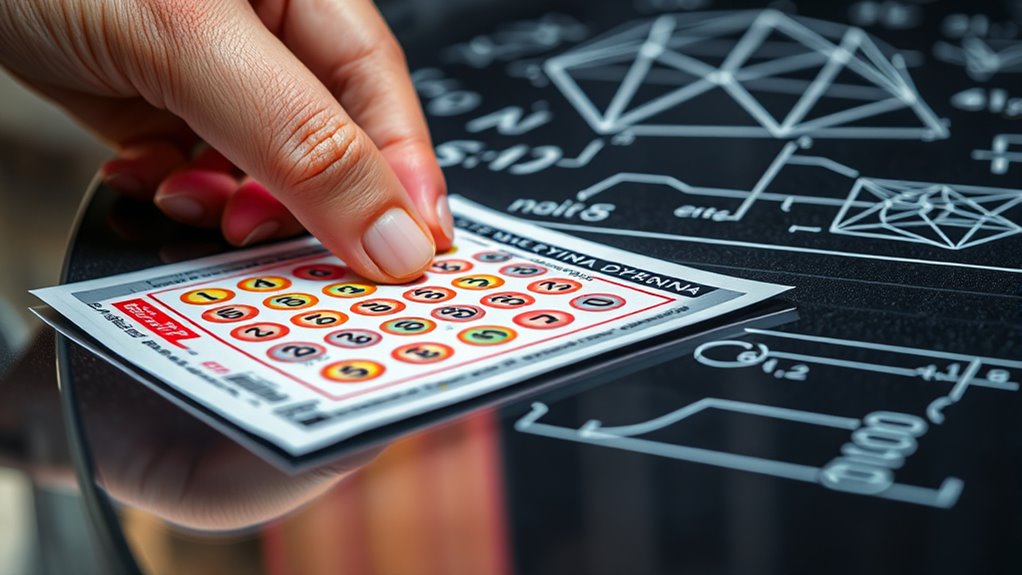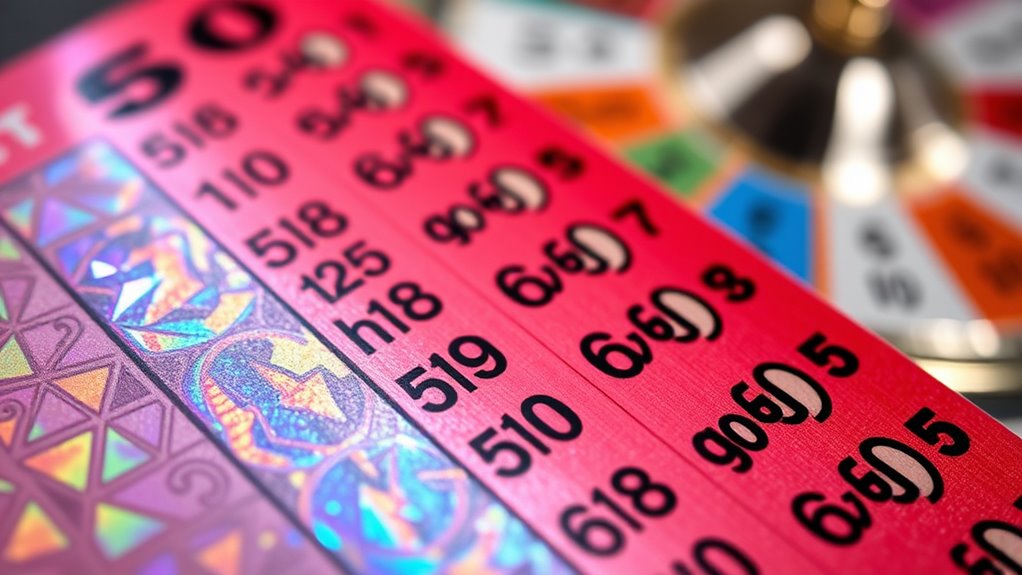The mathematics behind lotteries shows your chances are incredibly slim, no matter how many tickets you buy or how you pick your numbers. Winning depends on complex probability calculations, with odds often exceeding 13 million to 1. Each ticket has the same chance, and previous results don’t influence future draws. If you keep exploring, you’ll uncover more reasons why winning remains extremely unlikely.
Key Takeaways
- Lottery odds are calculated using combinatorics, with the chance of winning the jackpot roughly 1 in 14 million.
- Each ticket has an equal probability, and past results do not influence future draws.
- Additional game features like bonus numbers do not significantly improve your chances of winning.
- The expected value of a lottery ticket is negative, making long-term profit statistically unlikely.
- Despite possible wins, the probability of hitting the jackpot remains extremely low, explaining why you’ll probably never win.

Lotteries may seem like simple games of chance, but beneath the surface, complex mathematical principles determine your odds of winning. When you buy a ticket, what you’re really doing is engaging in a vast probability calculation, trying to outsmart odds that are stacked against you. Understanding how probability calculations and odds analysis work helps you grasp why winning the jackpot is so rare. Every lottery draw is a random experiment, and the chances of selecting the winning combination depend on the total number of possible outcomes. For instance, if a game requires you to pick six numbers out of 49, the total possible combinations are calculated through combinatorics, specifically by using the binomial coefficient formula. This formula considers all possible ways to choose six numbers from a set of 49, which results in over 13 million unique combinations. That means your chance of hitting the jackpot with a single ticket is roughly 1 in 13.98 million.
Odds analysis reveals just how unlikely it is to win. While most players focus on the dream of winning big, the mathematical reality is that the odds are heavily against you. For every ticket you buy, your probability of winning remains the same—no matter how many tickets you purchase. This is because each draw is independent, and previous results don’t influence future ones. The probability calculations become even more complex if the game involves additional features like secondary prizes or bonus numbers, but the core principle remains: the odds are always stacked against you. A solid understanding of probability theory helps explain why the likelihood of winning is so low.
Many players underestimate just how low their chances are and fall into the trap of believing in “hot” or “lucky” numbers, but odds analysis shows that every number combination has an equal chance of being drawn. It’s a simple case of combinatorics and probability theory at work. Over time, the expected value of a lottery ticket is usually negative, meaning you’re statistically likely to lose money. That’s why, from a mathematical perspective, winning the jackpot is almost like winning a lottery within a lottery—possible, but highly improbable.
Frequently Asked Questions
Can Lottery Odds Be Improved With Specific Number Patterns?
You wonder if choosing specific number patterns can improve your lottery odds. While some believe that number pattern analysis or statistical prediction techniques might help, lotteries are designed to be random, making patterns unreliable. No proven method guarantees a win. Instead, focus on understanding the randomness, and remember that every combination has an equal chance. Playing responsibly remains the best approach, since luck, not patterns, determines the outcome.
Do Lotteries Ever Change Their Odds or Prize Structures?
You might wonder if lotteries ever change their odds or prize structures. They do, often influenced by shifts in number frequency and ticket pooling strategies. When a game adjusts prize amounts or alters drawing rules, it impacts your chances. Lottery organizers tweak these factors to maintain interest, manage revenue, or respond to trends. Staying aware of these changes helps you understand how your odds evolve, but winning still remains a game of chance.
How Do Jackpot Sizes Influence Ticket Sales and Odds?
When jackpot sizes grow, you’re likely to see increased ticket sales, driven by jackpot psychology and the allure of a big win. Larger jackpots often influence number frequency choices, as players chase the big prize, ignoring the actual odds. This cycle boosts sales but doesn’t change the odds. So, while bigger jackpots attract more players, they don’t improve your chances of winning—they just make the game more exciting.
Are There Any Strategies to Increase Winning Chances Legally?
Imagine you’re steering a labyrinth, seeking the hidden prize. While there’s no magic trick, you can improve your odds with strategic number selection and proven betting systems. Avoid popular numbers and diversify your choices. Some players use systems like wheeling to cover multiple combinations. Remember, though, no method guarantees a win, but smart strategies can tilt the odds slightly in your favor—just like a savvy explorer in uncharted territory.
What Role Does Randomness Play in Lottery Number Draws?
Randomness plays a vital role in lottery number draws because each draw is statistically independent, meaning past results don’t influence future outcomes. The probability distribution of numbers is uniform, so every number has an equal chance of being selected. This unpredictability guarantees no pattern or strategy can reliably improve your odds. Understanding this helps you realize that lottery outcomes are purely chance, making winning highly unlikely despite any perceived patterns.
Conclusion
Remember, the odds are like a locked door you can’t quite reach. No matter how much you hope or how many tickets you buy, the numbers stay steadfast, symbolizing life’s unpredictable nature. The lottery isn’t just about luck—it’s a reminder that some mysteries remain beyond our grasp. Embrace the journey, not just the prize, for sometimes, the true treasure lies in understanding the odds and accepting what we can’t control.










